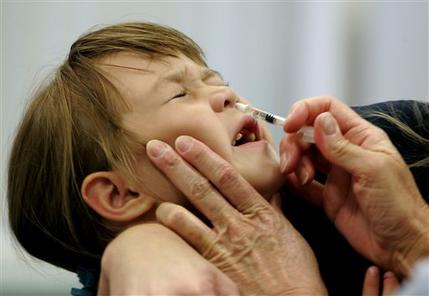Spraying a flu vaccine up young children’s noses is more effective than giving them a shot, a U.S. government panel ruled Wednesday.
The new recommendation, voted on during a meeting of the Advisory Committee on Immunization Practices, only applies to children aged 2 to 8, according to the Associated Press.
Currently, the only flu vaccine spray on the market is AstraZeneca’s FluMist, and it is approved for people aged 2 to 49. Instead of using a killed virus, the spray is made from a live but weakened flu virus, the wire service reported.
The spray triggers a stronger immune response in children who may have never had the flu before, experts say. Kids within that age group are about half as likely to get the flu if they get the nasal spray vaccine instead of a shot, research has shown, the AP reported.
Although federal health officials usually adopt the recommendations of the committee, the nation’s largest pediatrician’s group objected to the new recommendation, the AP reported.
FluMist is more expensive, it can’t be used for everyone and doctors have already ordered their vaccine doses for the fall flu season, a representative of the American Academy of Pediatrics said during the meeting.
But health officials stressed that flu shots are perfectly fine to use, the AP reported. FluMist costs about $23; shots range from about $8 to $22.
Source: webmd







